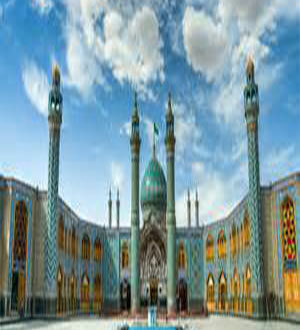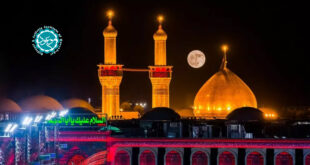First Imam (a.s.)
The Holy Prophet (S) from the beginning of his appointment until his death has introduced at several occasions Imam Ali ibn Abu Talib (a.s.) as his successor and an Imam. In the last year of his life he was blessed of performance Hajj-pilgrimage in Mecca. While, he was returning from the journey, and reached at a place called: Ghadir-e-Khum, a verse was revealed upon him:
“O Messenger! Make known that which hath been revealed unto thee from thy Lord, for if thou do it not, thou will not have conveyed His message. Allah will protect thee from mankind. Lo! Allah guides not the disbelieving folk.” (The Holy Qur’an, 5:67)
The Holy Prophet (S) stopped his journey right there and ordered that all Muslims should stop their journey. More than twenty thousand people gathered around him; he ordered that a pulpit should be made; he went upon the pulpit and took Ali ibn Abu Talib (a.s.) in his hands and raised him so that the people could see him. He delivered a sermon and said: “Upon whomsoever I am the master and guardian, Ali too is his master and guardian, O Allah whoever likes Ali, Thou should be his friend and whoever does enmity with him You too should do enmity with him.”
Omar was the first person who made allegiance with Ali and said: “O Ali! Congratulations you have become my master and guardian as well as of other believers.” After Omar, other Muslims too made allegiance with Imam Ali (a.s.). It was in this manner that under extreme heat and burning sun of Hejaz, that important task was materialized, and Imam Ali (a.s.) was officially appointed to caliphate and Imamate.2 This important incident was held on the nineteenth of Dhu al-Hijjah in the tenth year of migration, and in order to remember this historical day, we Shi’a celebrate that day as a feast called: Eid-e-Ghadir.
Imam Ali (a.s.) was born on thirteenth of the Holy Month of Raj’ab, in Mecca twenty three years before the migration; his father’s name was Abu Talib and his mother’s name was Fatimah. Since his childhood, he was placed under the direct care of the Holy Prophet (S) and was the prime individual who believed in him. The Holy Prophet (S) married his daughter Fatimah al-Zahra (SA) and thus he became his son in law. His distinctions and services are so vast that it is impossible to describe them.
He was matchless and unique in bravery and manhood; participated in wars and was always in the forefront and never feared any one waged war in support of Islam, and motivation of God’s worship; while encountering severe hardships and dangerous incidents, never spared himself from showing self-sacrifice and risking his life.
He was unique in worshipping and piety; was matchless in wisdom and knowledge and was the treasure of the Holy Prophet’s (S) knowledge. So far it was possible, he confronted with oppression and injustices and defended the oppressed, showed compassion and kindness towards destitute and helpless ones. Imam Ali (a.s.) loved agriculture and engaged himself in tree plantation, habitation of uncultivated lands, and construction of aqueducts.
When the Holy Prophet (S) left this world a group of hypocrites decided to dismiss Imam Ali (a.s.) from the caliphate. They disregarded and ignored his personal perfections and distinctions and remained naïve with all those recommendations of the Holy Prophet (S) and removed Imam Ali (a.s.) from the caliphate and succession.
Taking the excuse that Imam Ali (a.s.) was young and not suitable for the caliphate; had killed plenty of groups in the wars and due to this reason people had grudges against him, and therefore would not tolerate his caliphate. During the caliphate of Abu Bakr, Omar, and Othman, which went on for twenty-five years, Imam Ali (a.s.) was forced to sit alone in a corner where he trained and nourished worthy individuals.
After the killing of Othman, people took allegiance with him and for approximately four years and nine months he ruled the Muslims. He lived in the world for sixty three years and on the night of nineteenth of Holy Month of Ramadan in the fortieth year of migration, was struck a blow upon his head by Ibn Muljim’s hands in the Mosque of Kufa and martyred on the night of twenty first of the same month and was buried in the Holy City of Najaf in Iraq.
An Event from Imam Ali (a.s.)
The person in charge of the treasury of the Islamic Government said: “A necklace of pearls was present in the treasury. One day a daughter of the Commander of the Faithful, approached me and borrowed the necklace and said: ‘I am celebrating the feast of Eid al-Adha, would return it after three days, and in case it get lost I would pay you its cost.’
The Commander of the faithful saw the necklace in the neck of his daughter and recognized it and asked me: ‘Why have you committed a treachery regarding general wealth of the community?’ I explained him the matter and said: ‘Your daughter assured me that it wouldn’t be lost, and I myself also guarantee about its return; he said: ‘Right now take it from my daughter and if after that you would do so I would punish you’; the daughter said: ‘O my dear father! Do not I have that much right to borrow the necklace for three days to celebrate the days of Eid al-Adah?!’ Imam Ali (a.s.) replied: ‘O daughter of Ali, do not transgress from your right! Do all immigrant women have such a necklace to decorate themselves with it during the days of Eid al-Adha?’”3
Another Event
One day Imam Ali (a.s.) saw a woman who was carrying a water skin upon her shoulders to her home. He said: “Give the water skin to me so that I could bring it to your home, in between the path to her house he asked that woman how she had been; she replied: ‘Ali ibn Abu Talib dispatched my husband to one of the frontiers of the country where he was killed. A few orphan children have remained from him, and do not have the food and clothing, I am forced to work as a maid to earn a living for them; Imam Ali (a.s.) carried that water skin to her house and then returned, and spent the night in anxiety and sorrow.
In the morning he carried a bag full of food to her home and said to that woman:‘Open the door, I have brought food for the children.’ She replied: ‘May God be pleased with you and judge between me and Ali.’ Imam Ali (a.s.) entered inside home and said to the mother of the children: ‘Do you want to cook the bread and let me take care of the children or vice versa?’ The women replied that I am more familiar with cooking of the bread and you take care of the children.
Imam Ali (a.s.) kept the children amused and as well-cooked the meat; when the bread was cooked Imam Ali (a.s.) with his own blessed hands put the bread and dates into the mouths of the orphaned children and said: ‘O the light of my eyes eat and be contended with Ali.’ A woman from the neighborhood identified that honorable one and said to the widowed woman that: ‘This man is the Commander of the Faithful.’ That woman came near Ali (a.s.) and said: ‘O Commander of the Faithful! I am ashamed from you.’ Imam Ali (a.s.) replied: ‘I am ashamed from you because until now I was negligent about yours affairs.’”4
Second Imam (a.s.)
Imam Ali (a.s.) because of God’s command appointed his son Imam al-Hasan (a.s.) for Imamate.5 Imam al-Hasan (a.s.) was born on the fifteenth of the Holy Month of Ramadan in the Holy City of Medina in the third year of migration. His father was Ali (a.s.) and mother was Fatimah al-Zahra (SA) −daughter of the Holy Prophet (S). The Holy Prophet (S) loved al-Hasan (a.s.) and al-Husain (a.s.) very much and said about them that: “al-Hasan and al-Husain are best youths of the Paradise.6
After the demise of his exalted father Imam al-Hasan (a.s.) reached to caliphate and Imamate but was encountered with serious opposition from Mu’awiyah who was the ruler of Syria. Eventually his opposition lead to military confrontation and the armies of Imam al-Hasan (a.s.) and Mu’awiyah stood against each other; when Imam al-Hasan (a.s.) reviewed the general affairs of his soldiers, he witnessed treachery from a majority of his commanders. Therefore he avoided war and was forced to have a peace with Mu’awiyah. The basic reason of peace of Imam al-Hasan was due to two reasons:
Firstly: Although the number of the soldiers was significant, they were divided and disorganized. Among them there were plenty of individuals who were hypocrites and were supporters of Mu’awiyah; they had even promised to arrest Imam al-Hasan (a.s.) and hand him over to Mu’awiyah. Imam al-Hasan (a.s.) realized that if he wage a war with a disorganized and hypocrite army, defeat was absolutely certain; apart from that through the means of severe internal warfare, bloodshed and continuous confrontations, plenty of groups who were supporters were getting killed and the Muslim manpower was weakening.
Secondly: Mu’awiyah with his shrewdness tricked the people and through means of pretending and cheating, presented himself as supporters of the religion and defenders of the oppressed and said: “I do not have any other objective except advancement of Islam and implementation of commandments of the Holy Qur’an.”But Imam al-Hasan (a.s.) knew that: “Mu’awiyah is lying and does not have any other aim except continuation of his rule, but was it possible to make people comprehend this matter easily?!”
It was due to this point and other considerations that Imam al-Hasan (a.s.) decided for peace in order to expose the filthy personality of Mu’awiyah and his dangerous plots to the people so that the nation could understand very well about Mu’awiyah and the institution of Bani Umayyah so that ultimately the grounds for a revolution could be made readied.
Imam al-Hasan (a.s.), for the protection of the fundamentals of Islam made peace with Mu’awiyah and in the peace treaty mentioned these conditions, but Mu’awiyah did not respect any one of them. Imam al-Hasan (a.s.) lived in this world for a period of forty-seven years. Eventually with the encouragement of Mu’awiyah with the hand of his wife Ju’adeh binte Ash‘ath, he was poisoned and martyred on twenty-eight day of the Month of Safar, and was buried in the Jannatul Baqi‘ Cemetery in Medina.

 Mouood Mouood English Edition
Mouood Mouood English Edition



